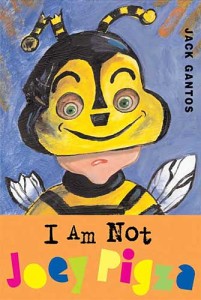 If you’ve been following this blog, then you know how much I love the Joey Pigza books and how accurately they depict the life of a young boy with ADHD. You also know that this is a series that many young people, especially boys, really seem to connect with.
If you’ve been following this blog, then you know how much I love the Joey Pigza books and how accurately they depict the life of a young boy with ADHD. You also know that this is a series that many young people, especially boys, really seem to connect with.
So I was a little reserved when I got to this book in the series. That was partly the Tolkienesque conditioning that I received as a child, which said that you can write one book, but if you write a sequel, you have to make the thing a trilogy. After that, you simply can’t end on an even number. You have to write five books (like the Dark is Rising series by Susan Cooper) or you have to write seven books (like the Harry Potter series by J.K. Rowling and the Chronicles of Narnia series by C.S. Lewis). Even numbers just don’t work.
Alas, this is the book is the possibly the best in the series. (I only say “possibly” because I am so in love with the scene in the first book in which Joey cuts off a girl’s nose—which is just improbable enough to be true.) In this book, Joey at last has to face the question his identity head on. Who is Joey Pigza? For kids with a label (i.e., any kid who ends up in special ed), they inevitably have to face the question “am I me, or am I my label?” What’s interesting about this book is that once again we have Joey’s father, Carter, urging him to embrace his difference, but while his mother has always opposed that point of view, now she is firmly in Carter’s camp. In effect, the adults have gone completely nuts, and while they claim to be in charge, ultimately, they prove ineffectual in that role. In many ways, this book reminds me of 2001: A Space Odyssey, where Hal, though nominally in charge, eventually proves ineffectual in the role for which he was designed. Wow, did I just cross reference Joey Pigza and 2001?
Since I woke up in the hospital I thought maybe the blow on my head had confused me a bit because the first thing I heard after my long scream off the roof was a man weeping as he said, “Wake up, Freddy. Come on, son. Open your eyes. You can do it!”
“Yes, sweetie,” a woman pleaded. “Wake up, honey.”
It was them, Mom and Dad, and as they spoke Dad tapped on the tight gauze bandage that was keeping my skull together and each tap bounced through my brain as if it were on springs.
“I am not Freddy,” I moaned with my eyes still closed. “You got me mixed up with another kid. I’m Joey Pigza and my head hurts.” I said all of this very softly as if little puffs of white smoke signals were rising out of my mouth.
“You are not Joey Pigza,” the man said firmly. “You are now Freddy Heinz, my son. And this is Maria, your mom.” (20-21)
Again, this is a plan of Joey’s father, Carter, who has won the lottery and renamed himself Charles Heinz, as if in taking on a new name he can take on an entirely new personality and disposition. Carter/Charles decides that Joey’s new name is Freddy, and while Joey tries on this new persona, the question is whether or not that new persona is enough to turn his luck around.
As an aside, note how much Jack Gantos violates the rules of dialogue attribution in this passage. His writing is strong enough that it doesn’t affect the flow of his prose, nor does he do it throughout the entire book.
This book benefits from a second read. Enjoy every minute of it.
Work Cited
Gantos, Jack. I Am Not Joey Pigza. New York: Farrar, Strauss and Giroux, 2007.
https://bookblog.kjodle.net/2011/06/12/i-am-not-joey-pigza-jack-gantos/
